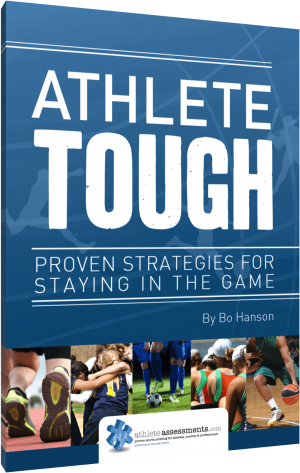Plain speak analysis of a report detailing the differences between the small percentage of super athletes and their competitors
What’s the difference between super champions, champions and athletes who don’t quite make it? It’s the quintessential coaching question and in this article we’ll recap the research findings that reveal the answers and tell you everything you need to know to apply the academic knowledge to everyday coaching.
Fundamentally, the report by the Institute of Coaching and Performance (within the University of Central Lancashire) found that athletes who perform consistently at the pinnacle of their sport have an almost fanatical approach to ‘challenge’. They’re prepared, they’re proactive and they know exactly what to do when an obstacle appears on their path to the top. The report also revealed other mental attributes that ‘super champions’ have in common.
The research set out to examine the role that ‘challenge’ or the ‘rocky road’ plays in an athlete’s path to the top. Authors analyzed the trajectory of three different classes of athlete categorized by their results – super champions, champions and athletes who almost made it. They sorted the data looking for differences and the commonalities.
Authors of the study found that one of the primary commonalities between super champion athletes was that their characters were all shaped by the difficulties or adversity they experienced in life, but deeper investigation revealed the crucial finding that – what athletes BRING to an experience is more important than the experience is itself.
Practically, what an athlete ‘brings’ points to the importance of mental skills training in a coaching program. Mental skills training develops toughness, resilience and that ‘bring it on’ attitude to any challenge that the authors of the study made special mention of.

Looking to build more mental toughness in your athletes?
Check out our ATHLETE TOUGH Program!
Developed initially as a support service to assist our existing clients with developing mental toughness in their athletes, the ATHLETE TOUGH Program has grown to be a standout, stand-alone product. Click the button below to find out why so many coaches love the ATHLETE TOUGH Program and read what they have to say.
This ability to meet any challenge head on and bring skills to an experience is not fully developed in all athletes. The mental ability lies on a continuum – some athletes begin with a little ability and some begin with the lot, but wherever your athletes’ mental skills lie, they can be developed.
To compile the report, researchers interviewed 54 athletes from a wide spectrum of sports including; soccer, rugby, athletics, rowing/sculling, curling, shooting, skiing, karate, judo, and boxing.
The research recounted that, “Successful athletes typically report a non-linear [not a direct path], complex, and individualized route to the top of their sport and must adapt to (anticipated and non-anticipated) developmental opportunities, set-backs and a range of transitions as they progress in their sport”. The authors noted that this was in contrast to the straight-line path that most training programs provide.
Researchers began the project to gain an understanding of this pathway for the benefit of the next generation of athletes. The report comes at a critical time explains Bo Hanson, Senior Consultant at Athlete Assessments, he says, “Coaches that we work with all over the world often comment on the way this generation of athletes, Millennials and Generation-Z, have been protected from the often harsh realities of the world. It is this lack of conditioning that leaves them lacking mental toughness.”
Architects of the study note that talent identification programs smooth the way for talented young athletes, providing them with funding, equipment and coaching – the necessary ingredients for success. However, the authors also note, as many of our coaches do, that the provision of these resources also shield athletes from life experience and the once upon a time struggle to rise above.
The report says that,
“Due to their early ability, many young athletes may often not encounter many challenges until late in their career. Increasingly, however, experiencing a degree of challenge during development is recognized as an essential characteristic of those athletes who make it to the very highest level in their sport.”
Crucially, authors highlight the importance of mental skills to convert those challenges, the report states, “Importantly, ‘challenge’ episodes should be preceded by skills training, and fully supported and debriefed, if the benefits of this approach are to accrue.”
The report clarified what a ‘challenge episode might be, stating the challenges in this context might include “playing up an age-group, out of position, de-selection or selection for particular competitions, or increases in training load.”
Other findings provided an insight into the way super champions think that about their own performance – the role of self-reflection and reward. Authors noted, “Clear differences were apparent in how different categories of participant thought about their sport and also in how they perceived progress and, consequently, administered self-reward. For example, the SCs (super champions) seemed intrinsically driven, with their reflection sometimes at an almost spiritual level”.
The report’s key finding supports the implementation of a mental skills development program, highlighting just how important it is for athletes to make the most of any challenge they encounter.
The report says,
“Super champions and to a lesser extent the champions, arrive at a challenge with an established attitude and approach, whilst the almost champions seemed almost entirely reactive.” The almost champions are unprepared.
Further endorsement for a mental skills program or the development of a mental framework enabling athletes to proactively deal with challenges as they arise comes with the report’s finding that facilitated styles of coaching were more prevalent amongst super champions.
Specifically, the report says, “We suggest that the facilitative rather than directive styles of parenting and coaching experienced by most SCs (super champions) may have been a contributory factor (to their success).”
Additionally, “Higher level performers are established in proactive coping habits.” Coping habits are what Bo Hanson calls ATHLETE TOUGH™ness Strategies.
The report concludes with this crucial quote,
“In summary, we feel that the differences between different levels of adult (athletic) achievement relate more to what performers bring to the challenges than what they experience.”
Developing Mental Skills
Bo Hanson, a 4 x Olympian and 3 x Olympic medalist, and author of ATHLETE TOUGH™, agrees that mental skills are as essential as physical skills in an athlete’s development. He says, “we work with coaches of elite level athletes across all sports and unanimously they recognize the need for athlete development in this area and consequently I was regularly being asked for my input into mental skills development.”
“Because we work with coaches on a daily basis, I know how extraordinarily busy they are, juggling professional, personal and family priorities, so I wanted to develop the program that athletes needed in a format that coaches could implement without interpretation. I wanted the program to incorporate the strategies that I used as an athlete and continue to refine as a coaching consultant.”
“I also know how skills and experience layer, ultimately building an athlete’s capacity for mental toughness. I wanted to give each athlete the opportunity to develop a mental framework that works for them, that they can apply in real time, so that when situations arise they know how to react, they know how meet a challenge and they know what to do. They can get the results they want. Regardless!”
Where to from here
The ATHLETE TOUGH™ program guides athletes to develop the mental skills that allow super champions to navigate the challenges that lead them to the top. ATHLETE TOUGH™ is a step-by-step program that coaches can administer weekly, taking an individual athlete or team through exercises and activities that address topics like; Staying in The Game, Teaching Toughness, Bouncing Back, Mastering Accountability, The Most Critical Relationship in Sport and Staying Tough Under Pressure. The program develops an athlete’s mental skill set by engaging them in reflective journaling, activities and exercises aimed at building their capacity to navigate challenge in a positive and proactive way.
At Athlete Assessments we’re here to provide you with excellence in service and to help you be your best. If there is anything we can do to be of service, don’t hesitate to contact us.







1 thought on “Answer to THE Coaching Question”
Bloody awesome! Thank you